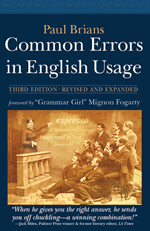could give a damn
yanira.vargasIf you don’t care at all about something, the standard popular expression is “I couldn’t give a damn.” People often say instead “I could give a damn,” which should logically mean they care. Note that we say “I don’t give a damn,” not “I give a damn” unless it’s set in some kind of negative context such as “do you really think I give a damn?” or “do I look like I give a damn?’
The same goes for parallel expressions where the last word is “darn” or some other expletive.
Just remember that in Gone with the Wind Clark Gable told Vivien Leigh, “Frankly, my dear, I don’t give a damn.”
See also could care less.
BUY THE BOOK!
